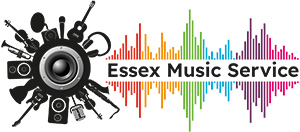Quality Assurance
Using Greater Essex Music Hub’s Effective Teaching and Learning Framework
We continue to monitor and assess the quality and impact of provision led by our workforce. We fully believe that supporting staff in their wellbeing in the workplace supports stronger work outcomes.
We continue to use the Greater Essex Music Hub Effective Teaching and Learning Framework, initially formed by the Music Education Hubs for Essex, Thurrock, and Southend-on-Sea in conjunction with Trinity College London and Canterbury Christ Church University as part of developing the original mentoring process. This is particularly apt given the forthcoming Greater Essex Hub with Southend-on-Sea and Thurrock in that we follow the same processes and guidelines, formed together.
In September 2024 training for District Lead Tutors and Heads of Service was offered to discuss, share, and ensure that there is consistency across the lead team in delivering quality assurance work across the Hub area.
Quality Assurance through Support and Development
Each tutor is in a group of tutors lead by an experienced District Lead Tutor. The maintain an ongoing relationship with each tutor to:
- share in the joy of teaching and making music with young people
- learn from each other as peers
- discuss what benefits the Tutor has gained from recent CPD engagement
- have a particular practice focus if requested
- discuss the Tutor’s ongoing work for the Service and provide support as appropriate
- work with each other in assessing, embedding and growing music provision and needs within the immediate and larger area of the District.
District Lead Tutors maintain regular contact with each tutor to ensure that the tutor
- is supported in their work for the Service to reach the best outcomes for themselves and the young people of Essex
- is supported in their wellbeing and health, including through Occupational Health, the Employee Assistance Programme,
- has regular contact with their District Lead Tutor and reduces the feeling of isolation
- develops their musical teaching practice / provision of music delivery, be that enhancing the skills they have, and/or accruing new skills.
- can add their voice to the culture, working practices, and future of the Service.
- works as an effective and powerful ambassador for the Service in their schools and community settings.
- helps the Service serve their local community and district better.
Quality Assurance through Observation
The annual (or more frequent if desirable) observation does not consist solely of observing teaching practice. As part of the ongoing relationship with the District Lead Tutor, rather than being a one-off remote occurrence, the observations are relaxed, and as well as using the Effecting Teaching and Learning Framework, also include:
- discussing the Tutor’s wellbeing and ways in which the Service can support them
- discussing the Tutor’s teaching practice / delivery of music provision and finding appropriate methods of support and engagement
- discussing the Tutor’s CPD experiences and needs, and observing the Tutor’s teaching practice / delivery of music provision
- a summary of the discussion between Tutor and District Lead Tutor / Head of Service, which focuses on:
- what type of tutor does the Tutor want to be for their students over the next few years (youth voice, aspiration and ambition for students, understanding of student context and cultural learning);
- what type of tutor does the Tutor want to be for themselves over the next few years (aspiration, personal ambition, training, support and developmental needs)
The GEMH Effective Teaching and Learning Framework below details six Outcomes of effective teaching and learning in teaching practice / delivery of music provision, each supported by two or three Principles, and in turn by suggested observed Strategies.
It has proved useful as a holistic and inclusive way of exploring the delivery and quality of music provision where usual performance management and appraisal observations fail to capture the nuances of music teaching and learning.
| Outcome | Detail |
| 1. The language of every session is music | Students make music throughout every session |
| Musical learning is primarily developed aurally and is supported by use of the voice and the use of notations. | |
| Students explore a range of different musical styles, genres and traditions, and this is evidenced in planning | |
| 2. Students are fully engaged in learning | Positive relationships are established and sustained with all students |
| Use of a variety of good quality activities and resources ensure that students are engaged throughout every session | |
| Where appropriate, technologies are used effectively to support students’ musical learning | |
| 3. All students are included in learning | Teachers support students to overcome barriers to learning |
| Students are always included in learning through suitably differentiated activities, resources and support | |
| 4. Creative approaches to teaching and creative learning allow students to develop holistically as musicians | Alongside developing instrumental skills, students engage in a range of integrated activities, including performing, composing, improvising and listening critically |
| By adopting creative teaching approaches, teachers provide opportunities for students to experiment and explore and influence their own learning | |
| 5. Students make clear musical progress in every session and over time | Students’ musical learning is enhanced through well-planned sessions and sequences of sessions, with clear focus and structure |
| Students understand and achieve planned learning intentions in every session | |
| Students’ learning is consolidated through clearly related learning episodes | |
| 6. Teachers and students engage in continual assessment of progress | Teachers engage in continual assessment to inform future planning and reflection |
| Students are involved in assessing their own learning | |
| Summative assessment forms part of formative assessment processes |
